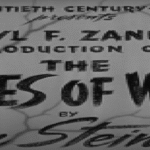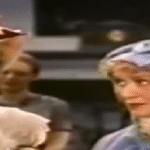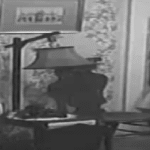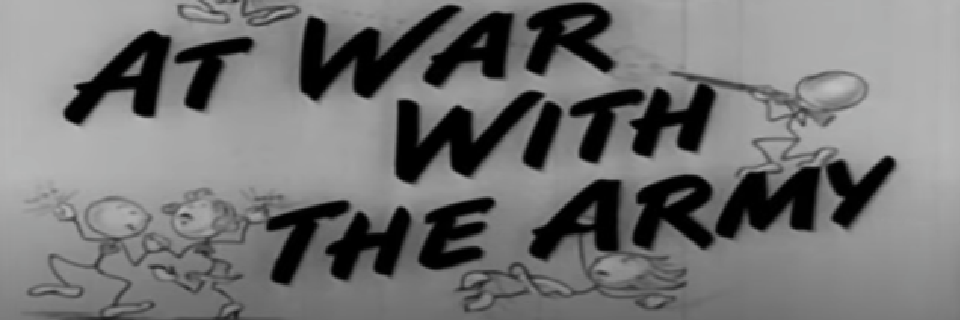At War with the Army is a 1950 musical comedy film that marked the first starring vehicle for the iconic comedic duo Dean Martin and Jerry Lewis. Directed by Hal Walker and based on the 1949 play by James B. Allardice, the film takes place in a United States Army training camp during World War II and serves as a light-hearted, often chaotic, commentary on military life. With its blend of slapstick humour, catchy musical numbers and the electric chemistry between its two leads, the film offers an amusing, if uneven, window into post-war American entertainment.
The story is set primarily at a stateside Army base during the final stages of World War II, where enlisted men are undergoing basic training. The narrative centres around two former nightclub partners who have taken very different paths in their military careers. First Sergeant Vic Puccinelli, played by Dean Martin, is smooth-talking, charming, and seemingly comfortable with his position of authority. In contrast, Private First Class Alvin Korwin, played by Jerry Lewis, is bumbling, naïve, and constantly finds himself entangled in one disaster after another.
Their dynamic fuels much of the film’s humour. While Vic attempts to manage the chaos of daily military life, Korwin’s antics disrupt any sense of order. Their history as entertainers adds a layer of irony: once equals on the nightclub stage, they now occupy very different rungs of the military hierarchy. This imbalance provides a backdrop for both comedy and mild tension, as Korwin continuously seeks favours from his old friend, only to be met with frustration or indifference.
Alvin’s chief desire throughout the film is to secure a pass so that he can visit his wife and newborn child, a wish that seems perpetually out of reach due to his ineptitude and a series of comedic misunderstandings. From getting into trouble with superiors to accidentally impersonating other soldiers, Alvin’s journey is one of constant missteps, each more ridiculous than the last. Jerry Lewis’s physical comedy is on full display here, from elaborate pratfalls to exaggerated facial expressions and frantic energy, all of which would become hallmarks of his later career.
Vic, on the other hand, tries to maintain a sense of calm amidst the absurdity. However, he too faces his own complications. His superior officer, Major Spangler, is an insufferable stickler for rules, and Vic must frequently navigate his whims while also handling the chaos of his subordinates. Spangler’s wife is also a cause of concern, particularly due to her attraction to Vic, which he must manage without compromising his position. Dean Martin plays Vic with his signature ease and charisma, lending a natural counterbalance to Lewis’s manic energy.
The supporting cast contributes further comedic and musical moments. Polly Bergen plays Helen, a singer and Vic’s romantic interest, adding both a love triangle and musical interludes to the story. Helen, glamorous and practical, represents a civilian tie to the outside world and offers a brief respite from the military antics. She challenges Vic’s self-centred tendencies and forces him to consider the kind of man he wants to be outside of his uniform.
The musical numbers are peppered throughout the film and vary in tone. Martin delivers several crooner-style performances with his usual suave flair, including romantic ballads that showcase his smooth baritone voice. These moments are often interwoven with comedic interruptions or misadventures involving Lewis, creating a contrast between Martin’s calm musicality and Lewis’s chaotic presence.
One of the most memorable sequences in the film involves a disastrous attempt by Korwin to operate a machine in the base’s post exchange, leading to a series of physical gags and escalating panic. In another scene, Korwin finds himself roped into performing in a variety show, leading to a hilariously awkward musical duet that underlines the duo’s origins in vaudeville-style comedy. These scenes highlight the strengths of Martin and Lewis as a team: Martin the straight man, Lewis the clown, both feeding off each other’s timing with skill honed on stage and radio.
Though much of the plot is driven by humour, At War with the Army also offers glimpses into the absurdities of military bureaucracy. The soldiers are frequently caught in a web of arbitrary rules, demanding superiors and repetitive drills. These frustrations are played for laughs, but they also reflect the everyday tedium and inefficiencies of institutional life. There is no real war in the film, only the war of personalities, paperwork and protocol that takes place within the base’s gates.
While the film doesn’t aim for deep social commentary, it does touch lightly on the emotional cost of military service. Korwin’s desperation to see his family, and his repeated failures to do so, lend his character a certain pathos beneath the comic surface. Likewise, Vic’s growing disillusionment with the rigidity of military life points to the tensions between individual freedom and systemic control, themes that resonated in the post-war years when veterans were adjusting to civilian life.
The tone of the film remains predominantly upbeat, however, and it avoids delving too deeply into these undercurrents. Its focus is on entertaining its audience, and it succeeds in doing so through a series of gags, musical performances and quick-paced interactions. The direction by Hal Walker keeps things moving briskly, although the film’s stage origins are evident in its limited number of settings and dialogue-heavy scenes.
One noticeable aspect is the film’s relatively low production budget, which is apparent in its minimal set design and simple cinematography. Despite this, the film remains lively, thanks largely to the charisma of its leads. Martin and Lewis were at the beginning of their prolific partnership, and their chemistry is undeniable. Even in moments when the script falters or the pacing lags, their energy keeps the viewer engaged.
At War with the Army was the first of several films featuring Martin and Lewis as a duo, and though it is not considered their finest, it laid the groundwork for their later successes. The film has since entered the public domain, leading to widespread availability but also to numerous low-quality versions. Nevertheless, it holds historical value both as a document of early 1950s entertainment and as an introduction to one of comedy’s most famous partnerships.
The film’s legacy rests not on its narrative sophistication but on its spirited performances and its nostalgic portrayal of army life seen through the lens of comedy. It is a snapshot of an era in American film when audiences sought laughter and music, and where the complications of war could be softened through farce and charm.







